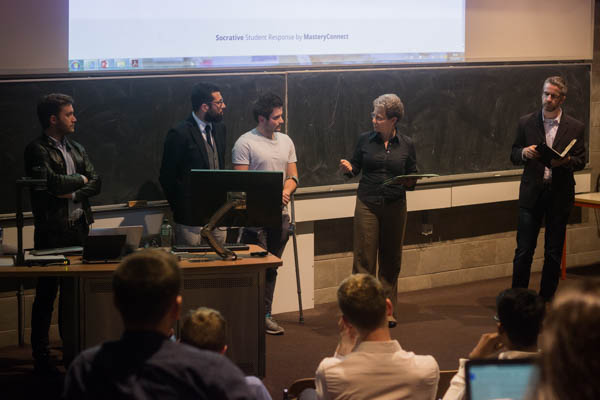This evening, Declan O’Donnell of Focus took first prize in the Dublin University Business Society (DUBES) Corporate Social Responsibility Week pitching competition, claiming €2,000 for his company’s business idea.
The event focused on companies that provided solutions to prevailing societal issues, with particular focus on disability and mental wellbeing. The teams presented their ideas to a panel of judges that included: Prof Mary Lee Rhodes, Director of Teaching & Learning in the School of Business; Professor Guilio Buciuni, lecturer on entrepreneurship in Trinity; Amr Dawood, founder of the Good Summit; Conor Nolan, founder of Wattspot and supporter of social enterprise through Showoff; and Senan O’Riain, manager of Business Development in IDA Ireland.
“It was a tough decision as the teams are all in such different stages of development and we really struggled to come to a fair decision”, Rhodes told the teams before announcing the winner.
The winner, Focus, is an app aimed at the visually impaired. The target market is adults who suffer from an inability with reading small text and labels. The app uses fonts such as dyslexie, which has been developed for people with dyslexia, and many others created specifically for people with visual impairments.
With the app, users take a picture of a piece of text rendered on screen with the use of AI. Text is then presented to the user in an ideal font format, with large line and character spacing, as well as high contrast in colours and sans-serif styling. The text is entirely adjustable and gives users the option to listen through the text if needs to be. The company plans to charge users on a monthly subscription basis.
Amongst the other teams was Arthaud Mesnard, who pitched KeepAppy, an app that was developed to help people maintain their mental and physical wellbeing. The app advises its users to log on twice a day, morning and evening, and record their mood on a scale of one to seven. A user then enters data about their diet, exercise, intake of alcohol or drugs and levels of stress and energy. All these factors are collected over time and a user gets some significant results about what affects their mood.
The app has the added capability of goal setting for users who wish to log their aims and achievements, as well as a beta chatbot on Facebook Messenger. KeepAppy intends to battle with other social media apps for the attention of users as a way to improve their mental wellbeing.
Paul Allan, CEO of Aurius, pitched his market-disrupting hearing aid solution. The company offers a device that can be paired with a smartphone or tablet, allowing users to tune the device at home. The algorithm was developed by Luc Bellintini, a second-year maths and economics student, to help those with hearing difficulties save money and time by eliminating the need to see a professional tuner.
Another business developed to aid with physical disability was EnableArm. Aaron Hannon is a first-year engineering student from Mayo and has spent the last year developing his business idea. The device assists people with limited hand dexterity in shaving their face.
Contrary to its name, EnableArm is a headset that is worn like a pair of headphones. The design includes a semi-circular track that runs around the front of the user’s face and along which a razor moves, automatically shaving the face of its user. Inspired by his late grandfather, who suffered from paralysis and was frustrated by his inability to look after himself, Hannon developed a fully functional prototype in a 3D printer with the use of recycled materials. The device is currently being patented and Hannon hopes to enter the market with his innovative product.
Homeless Helpline, pitched by Ellen Maguire, Eoghan O’Connor and Katie McCormack, is a business venture that aims to provide support for rough sleepers and homeless people across Ireland. They take their inspiration from Australian company Orange Sky, targeting the issue by providing a mobile laundrette for people who found themselves without access to these services. They aim to start small, with a mobile service, but expand to a more permanent, physical space in Dublin.







